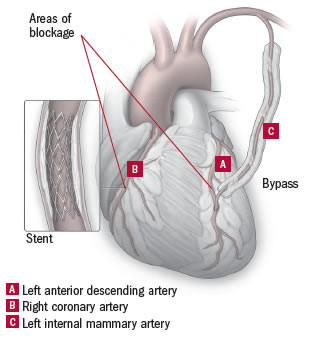
Tips to leverage neuroplasticity to maintain cognitive fitness as you age

Can white noise really help you sleep better?

Celiac disease: Exploring four myths

What is prostatitis and how is it treated?

What is Cushing syndrome?

Exercises to relieve joint pain

Think your child has ADHD? What your pediatrician can do

Foam roller: Could you benefit from this massage tool?

Stepping up activity if winter slowed you down

Common causes of cloudy urine
Heart Health Archive
Articles
Lowering blood pressure: How low should you go?
Blood pressure that is Image: Thinkstock |
The dangers of hypertension are well documented, but low blood pressure levels can cause problems, too.
Get cracking: Why you should eat more nuts
Nuts are rich in unsaturated fats, fiber, and other nutrients with possible cardiovascular benefits. Images: Thinkstock |
Munching a small handful every day may protect your heart.
Get a leg up on varicose veins
Leaky leg veins can cause painful skin changes. But safe, effective treatments can fix this common problem.
Varicose veins—those dark blue or purple leg veins that bulge just beneath the skin's surface—leave many sufferers feeling self-conscious. But beyond the cosmetic considerations, pooling of excess blood in the lower extremities can cause painful leg swelling and skin ulcers.
Bypass plus angioplasty: The best of both worlds?
In hybrid heart surgery, the blocked or narrowed left anterior descending artery is bypassed with the nearby left mammary artery, while another blocked artery (in this case, the right coronary artery) is opened with angioplasty plus a stent. Illustration by Scott Leighton |
Known as hybrid coronary revascularization, this technique may become more widely available in the future.
Listening to your favorite music may relax your arteries
Music has charms to soothe a savage breast, as the 17th-century poet William Congreve wrote. In fact, music might soothe your heart by relaxing your arteries, a small study hints.
Researchers measured arterial stiffness in 20 healthy young adults before and after they listened to 30 minutes of classical music, rock music, or nothing (as a control). They used a technique called carotid-femoral pulse wave velocity (PWV). This measures the time it takes for the pulse to travel to the carotid artery in the neck versus the femoral artery in the leg. Longer pulse times suggest stiffer arteries, which translates to a higher risk of cardiovascular problems. Higher "wave reflections" (another measure of artery health) are also linked to heart disease risk.
Acetaminophen seems safe for the heart
After a small study hinted that taking acetaminophen (Tylenol) might increase blood pressure, some doctors worried that this popular painkiller might not be as safe as once assumed, particularly for people with heart disease. But those fears now appear unfounded, according to a March 2015 report in Hypertension.
Using records from a U.K. health database, researchers identified nearly 25,000 people ages 65 and older with high blood pressure. They then compared people who took acetaminophen with people who didn't take the drug over a 10-year period. After adjusting for possible confounding factors, they found no elevated risk of heart attack, stroke, or any cardiovascular events among people who used acetaminophen—even among those who took the painkiller frequently. Despite this reassurance, be aware that high doses of acetaminophen can damage your liver. Don't take more than 3,000 milligrams (mg) a day. Over-the-counter pills (including some cold and flu drugs) may contain up to 650 mg of the drug, so check labels carefully.
Adding a diuretic to your blood pressure drug
Diuretics can augment the blood pressure-lowering effects of other drugs, such as ACE inhibitors. Image: Thinkstock |
It may boost the effect of your current medication.
People with high blood pressure need this B vitamin
It appears that people with high blood pressure who take folate along with the blood pressure medicine enalapril (Vasotec) may be less likely to have a stroke than people who take enalapril alone.
Special MRI scan could identify stroke risk in people with atrial fibrillation
Atrial fibrillation is a heart rhythm disorder that affects millions of people. It can lead to potentially disabling or deadly strokes. Researchers from Johns Hopkins University School of Medicine adding motion-tracking software to standard MRI heart scans of 149 men and women with atrial fibrillation. The scans revealed specific changes in the muscles of the left atrium that increased stroke risk in some of the volunteers. These changes were not associated with age or other risk factors for stroke. This could help many people with this condition to avoid taking warfarin or other clot-preventing medications for life. But it is much too early to include MRI as part of the standard evaluation of people with atrial fibrillation — not to mention that such scans would significantly increase the cost of these evaluations. For now, doctors will continue to use standard tools to help determine stroke risk.
More than a stretch: Yoga’s benefits may extend to the heart
Yoga is good for the muscles and the mind. New research suggests that it may also be good for the heart. A review of yoga and cardiovascular disease published in the European Journal of Preventive Cardiology indicates that yoga may help lower heart disease risk as much as conventional exercise, such as brisk walking. It can help people lose weight, lower blood pressure and cholesterol, and ease stress. Each of those changes works to prevent heart disease, and can help people who already have cardiovascular problems.

Tips to leverage neuroplasticity to maintain cognitive fitness as you age

Can white noise really help you sleep better?

Celiac disease: Exploring four myths

What is prostatitis and how is it treated?

What is Cushing syndrome?

Exercises to relieve joint pain

Think your child has ADHD? What your pediatrician can do

Foam roller: Could you benefit from this massage tool?

Stepping up activity if winter slowed you down

Common causes of cloudy urine
Free Healthbeat Signup
Get the latest in health news delivered to your inbox!
Sign Up











